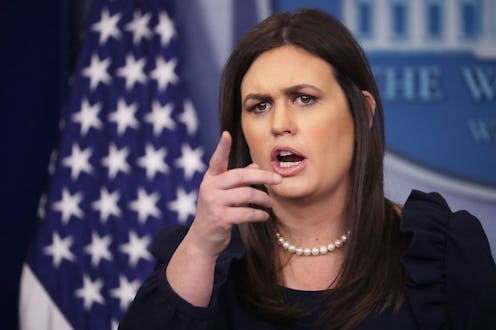News
The White House Just Basically Said Police Brutality Isn't Its Problem

On Wednesday, the Trump administration weighed in on a fatal police shooting, and what it said struck a pretty sharp contrast with the previous presidential administration. The White House said Stephon Clark's fatal shooting by police in Sacramento, California, earlier this month should remain a matter for local law enforcement to deal with, seemingly ruling out the possibility of a civil rights investigation by the Department of Justice.
Throughout the Obama administration, numerous high-profile killings of black Americans drew civil rights investigations by the Justice Department, including following the deaths of unarmed black Americans like Trayvon Martin, Michael Brown, and Eric Garner.
Thus far, the Justice Department under President Donald Trump has not followed suit with the same frequency, or the same attention paid to police-committed shootings ― although, Attorney General Jeff Sessions did authorize a federal investigation into last year's deadly Charlottesville neo-Nazi rallies.
On Wednesday, when asked about the shootings of Clark and Baton Rouge man Alton Sterling, White House Press Secretary Sarah Huckabee Sanders stated that issues involving police brutality should remain the responsibility of "local authorities," and was not something the federal government should "weigh in on." (On Tuesday, Louisiana officials had decided not to charge the two police officers involved in Sterling's death.)
"We want to make sure all law enforcement is carrying out the letter of the law," Sanders told the White House press corps. "The president is very supportive of law enforcement. But at the same time, in these specific cases, and these specific instances, these will be left up to local authorities to make that determination, and is not something for the federal government to weigh in on."
Sanders was responding to questions both about Clark's shooting death, and the decision by Louisiana attorney general Jeff Landry on Tuesday not to criminally charge the two police officers who fatally shot Sterling back in 2016. Sterling's death was captured on video, but still did not lead to charges; CNN is also reported that there are more, yet-unreleased videos of the shooting that are "very graphic" and "disturbing."
Clark, 22, was shot 20 times in his grandmother's backyard on March 18. The officers who shot Clark reportedly said they believed he was armed with a gun, but the only item found on his body was a cellphone. The shooting touched off protest and unrest throughout the city of Sacramento, with Clark's brother and grandmother decrying the circumstances of his death.
In a press conference on Monday, Clark's grandmother Sequita Thompson insisted through tears that the police didn't need to kill her grandson, questioning why they could have at least not fired at him non-lethally, or used a taser or police dogs.
"They didn't have to kill him like that. They didn't have to shoot him that many times," Thompson said, as CNN detailed. "Why didn't you just shoot him in the arm, shoot him in the leg, send the dogs, send a Taser. Why? Why? Y'all didn't have to do that."
Since the 2014 shooting of Brown by police officer Darren Wilson in Ferguson, Missouri, activists and protesters have fought to increase the visibility of deadly police shootings against black Americans ― the Black Lives Matter movement, for example, grew out of the Ferguson demonstrations. Such activists have sought to see judicial and legal reforms passed which would lead to fewer killings by police, and to make officers more easily held accountable when they do kill.
As it stands now, American police officers are overwhelmingly unlikely to held held criminally accountable for killing people in the line of duty, and are also extremely unlikely to even be taken to trial. As CNN noted on Tuesday, research suggests that there were approximately 1,000 police shootings per year between 2005 and April 2017, and yet only 80 officers over that time were arrested for murder or manslaughter. Of those 80, a mere 35 percent have been convicted of the charges.